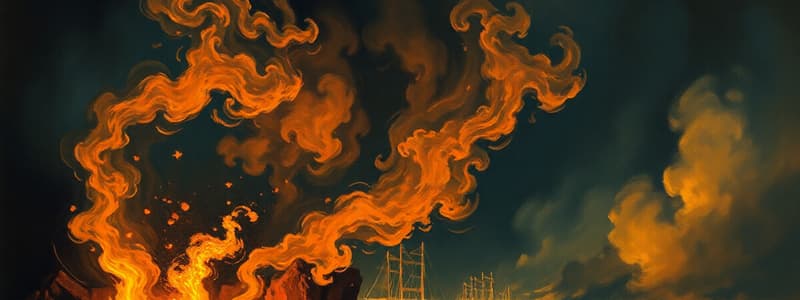Podcast
Questions and Answers
What is produced as a result of complete combustion?
What is produced as a result of complete combustion?
- Carbon dioxide and water (correct)
- Nitrogen oxides and water
- Carbon monoxide and soot
- Carbon monoxide and energy
Which of the following is an indicator of incomplete combustion?
Which of the following is an indicator of incomplete combustion?
- High levels of oxygen
- Production of hydrogen gas
- An orange flickering flame (correct)
- A steady blue flame
What dangerous gas is a result of incomplete combustion?
What dangerous gas is a result of incomplete combustion?
- Ozone
- Carbon dioxide
- Methane
- Carbon monoxide (correct)
What happens to energy during complete combustion?
What happens to energy during complete combustion?
Which of the following statements is true regarding the products of incomplete combustion?
Which of the following statements is true regarding the products of incomplete combustion?
Flashcards
Combustion
Combustion
A chemical reaction where a fuel reacts quickly with oxygen, producing oxides (CO, CO₂) and releasing energy.
Complete Combustion
Complete Combustion
A type of combustion where all the available fuel is used, resulting in only carbon dioxide, water, and energy as products.
Incomplete Combustion
Incomplete Combustion
A type of combustion where there's limited oxygen, leading to the production of carbon monoxide and carbon along with carbon dioxide, water, and energy.
Carbon Monoxide (CO)
Carbon Monoxide (CO)
Signup and view all the flashcards
Hydrocarbons
Hydrocarbons
Signup and view all the flashcards
Study Notes
Combustion Defined
- Combustion is a rapid chemical reaction between a fuel and oxygen, producing oxides and energy.
Types of Combustion
-
Complete Combustion:
- Requires a plentiful oxygen supply.
- Fuel is entirely consumed.
- Produces carbon dioxide, water, and energy.
- General formula: Hydrocarbon (CxHy) + Oxygen (O2) → Carbon Dioxide (CO2) + Water (H₂O) + Energy
-
Incomplete Combustion:
- Occurs when oxygen supply is limited.
- Fuel is not entirely consumed.
- Produces carbon monoxide, carbon, carbon dioxide, water, and energy.
- Often indicated by an orange flickering flame.
- Visible soot is a sign of incomplete combustion.
Incomplete Combustion Dangers
- Carbon Monoxide Poisoning:
- A highly toxic, odourless, and colourless gas.
- Can cause symptoms like headaches, dizziness, nausea, and respiratory problems.
- Often a product of incomplete combustion in confined spaces (e.g., running a car engine in a closed garage).
Common Hydrocarbons
- List of common hydrocarbons is not provided in the text.
Studying That Suits You
Use AI to generate personalized quizzes and flashcards to suit your learning preferences.




